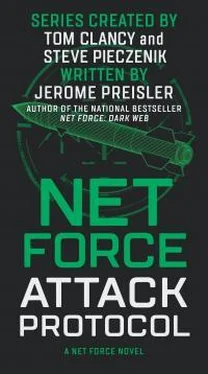“The police, the FBI, Net Force...all three, possibly. You, yourself, said it. The city was crawling with law enforcement. And keeping quiet the details of a crime is typical during an open probe,” Cosa said. “You see, Grigor. We have too many dangling threads. The explosion at One Liberty, for example. By now it must have dawned on investigators that Ciobanu couldn’t have planted the bomb there. Not unless he was in two places at once. Do you agree?”
Grigor looked at him. “Yes,” he said. “I do.”
“And the garage attendant,” Cosa said. “Yalin. I personally gave him the Jumpdrive that passed along the computer worm.”
“You could have assigned that to a messenger.”
“It was too important to delegate. Besides, it’s long done. And in his case your cleanup had unintended consequences.”
“I saw that the car and his body were destroyed.”
“That destruction involved the FBI’s top New York Cybercrimes man. Someone who saved the President of the United States. Net Force’s Director of Cyber Investigations.”
“Harris.”
“Yes,” Cosa said. “I do not raise any of this to be critical of your work. The circumstances were what they were. But the Western lights you mention... You see why it’s time to leave them behind.” He spread his arms expansively to indicate his surroundings. “Enthralling as they might be.”
Grigor’s eyes met his. “You said you wanted to discuss my present assignment.”
“Yes, Grigor. Or is it Mr. Gelfland?”
“Whatever.”
Cosa grinned.
“There’s great friction here about the CloudCable initiative. In political circles, at least. As might be expected when the CIA and National Geospatial Agency—two primary sources of American intelligence—enter into a partnership with Olympia, the largest e-commerce company in the world.”
“Owned by James Yates, a trillionaire who also owns newspapers, television networks, and social media,” Cosa said. “People here mistrust such alliances. They see a blurring of lines. The government and the private sector. Surveillance and civil liberties. All that immature nonsense. In fact, CloudCable is an American capitalist venture at its most definitive—and technologically state of the art.” He paused. “One thing they’ve kept secret is ONI’s involvement. There’s more to the deal than a new computing cloud.”
“As if that weren’t enough.” Grigor laughed a little. “Anyway, yes. I understand. The Office of Naval Intelligence is responsible for keeping an eye on submarines.”
“With other subordinate agencies,” Cosa said. “But its current monitoring system is archaic and slapdash. Some fiberoptics, some mobile arrays, and seventy-year-old hydrophonic cables that are a step above cups on a string. There’s nothing close to consolidation.” He paused. “CloudCable is partly designed to remedy that, and completion of ONI’s piece of the network has already advanced beyond the rest. It’s well ahead, in fact.”
“Yes, I know,” Grigor said. “I’m not surprised Naval Intelligence is a player behind the scenes.”
Cosa regarded him over the rim of his tumbler.
“ONI is the main reason the Americans have poured a fortune into the underwater cable system,” he said. “But they’re less concerned with us than China. Or Chinese ambition and underwater stealth capabilities. That’s behind their haste to complete the project.” He took another drink. “Have you ever really thought about the crucial nature of sea power? Specifically, why the strongest nations on earth are always competing for command of the sea?”
Grigor looked at him and shrugged.
“It has fish,” he said. “You can piss in it when you’re swimming and no one notices.”
“Ha! Good start!” Cosa laughed and regarded him another moment. Then his face turned serious. “Grigor, I think it’s time you learned more about how you fit into the big picture. About the real purpose of Operation Chimera. It’s been strictly need-to-know to this point. But with your ship setting sail in just a few weeks, you do need to know you’re going to have some help.”
“Specifically?”
Cosa drained his glass.
“Specifically,” he said, “a marine task force of Spetsnaz’s best. Black berets. And all the lethal weapons they can carry.”
8
Satu Mare District, Romania
Carmody tapped the wearable on his forearm while Wheeler and Begai kept an eye on poor, confused Clinia from Cluj. She sat, fur coat and all, in an antique chair behind him and across the room.
She had been cut loose and left stranded by tonight’s boyfriend. Tossed aside like she was worthless and disposable. She was scared and leagues out of her element, and Carmody felt sorry for her. But Clinia wasn’t his problem. He already had enough problems. Like getting through the trapdoor his quarry had slipped through, so he could get after him.
Even then, catching up wouldn’t be easy. Their man had a solid lead and was on his home turf. He knew what was around every turn, while Carmody didn’t even know where the turns might lie.
It was a disadvantage he’d anticipated, and Kali’s wireless protocol sniffer-spoofer was his best means of overcoming it. His only other option was to blow the trapdoor, but that might take the rest of the floor down with it. So it wasn’t really an option at all. He needed her app to work. She had timed its key emulation speed at between one and two minutes, two being the outside measure, which by most calculations was lightning fast. But right now it felt like an hour.
Carmody waited, a silent clock in his head chewing through the precious seconds. Fifty-six, fifty-five...fifty-three. His touch screen was populating with RFID tags, their bit patterns racing across it in clusters of zeros and ones as the computer grabbed them out of the air for analysis. Forty-eight, forty-seven...
He was good with technology. He got it, embraced it, applied it to his work in countless changing ways. But he was a classic, out-of-the-box user, and Kali Alcazar the Outlier could not have been more the opposite. Aware of the castle’s secret passages, and the millions of dollars Drajan Petrovik spent on renovations and upgrades, he had asked Kali to help him prepare for the unexpected. Like his present quarry escaping through a trapdoor escape hatch and vanishing like a ghost in a haunted house.
Kali’s snoofer was configured to do two things. One of them was to scan every known wireless platform used in smart-building automation. The networks that controlled doors, lights, climate-control systems, window blinds, and other Internet of Things gadgets. The other was to inject the scanner with a machine-learning algorithm—an AI ghost in the machine—that would synthesize millions of fingerprints, handprints, and retinal characteristics and fool any biometric authentication.
“Every fingerprint is unique,” she had explained, “but the attributes stored in biometric systems are not. They can’t be. There are constant daily microchanges in every print. Scratches, burns, cuts. Scanners detune themselves to be less accurate, or they would never find matches.”
Kali had reverse-engineered the software, built her own reader hardware with spare parts scavenged from around Janus, and used both to study the biodata and cryptography on several radio-frequency ID cards. She explained to Carmody that there were different RFID platforms and encoding formats, but most used the same standard for tags.
He got lost right about there. Which was okay. He hadn’t cared about the technical ins and outs of the thing. He still didn’t. He just needed to know it would work.
He waited another ten seconds that felt much longer.
Читать дальше












